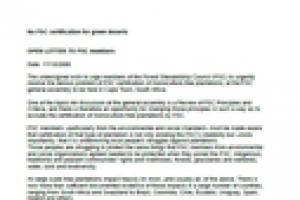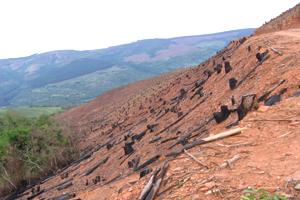Since 2006 the small landlocked South East Asian nation of Laos has seen an explosion of small, large and medium scale plantations, particularly rubber, eucalyptus and biofuel crops. This increase in industrial tree plantations has not come about by itself however, but has been promoted by IFI's over the past decade as a means to increase Lao GDP. Foremost among the promoters of plantations development in Laos is the Asian Development Bank.
Large-Scale Tree Plantations
Industrial tree plantations are large-scale, intensively managed, even-aged monocultures, involving vast areas of fertile land under the control of plantation companies. Management of plantations involves the use of huge amounts of water as well as agrochemicals—which harm humans, and plants and animals in the plantations and surrounding areas.
Other information
15 December 2008
Other information
15 December 2008
Rubber is one part of life of the people of the South, related both to the culture and economy of the last 108 years. The monoculture production system has replaced a traditional system of rubber forests, where rubber used to be grown in amongst fruit orchards and natural forests known as a suan somrom or “integrated garden”. Rubber plantations have been promoted through the government’s Welfare Fund for Rubber Plantations.
Other information
15 December 2008
Every year for the past decade or so, Vietnam has faced paper shortages. This year is no exception. In May 2008, Vietnam's
newspapers reported that publishing houses and printers were facing difficulties in buying supplies. The shortages were happening even though the country's two biggest pulp and paper mills, Bai Bang and Tan Mai were operating at full capacity and paper imports had increased sharply during the first months of the year.
Bulletin articles
15 December 2008
Just outside the climate change conference in Poznan this morning, Friends of the Earth held a demonstration against the World Bank's funding of coal-fired power plants. World Bank figures on stilts wearing black suits fought against polar bears, throwing pieces of coal at them. "This is a typical example of how European NGOs just don't get it on climate change," someone behind me said. It turned out he worked with the Asian Development Bank in the Bank's climate change unit.
Other information
15 December 2008
Ask any Cambodian what s/he considers to be the foundation of society and life in Cambodia and the answer is likely to be “land.” Land is livelihood. But equally, land is valued as an emblem of rootedness, belonging and stability, and is widely regarded as the very basis of social organisation in the country.
Other information
15 December 2008
In December 2005, Burma's Senior General Than Shwe ordered the start of a nation-wide campaign to plant Jatropha curcas for
biodiesel production. The country was to plant eight million acres [3.2 million hectares], or an area the size of Belgium, within three years. Each of Burma's states and divisions, regardless of size, were expected to plant at least 500,000 acres. In Rangoon Division, 20% of all available land will be covered by jatropha.
Other information
25 November 2008
As a contribution for facilitating the involvement of civil society in the protection of the Earth’s climate, the WRM has recently published four briefings related to climate change:
Bulletin articles
25 November 2008
Two years ago, 5.3 million hectares across Indonesia were engulfed in flames in the worst fire season since 1997/98. Haze blanketed large parts of South-east Asia, hiding additional peat and forest fires in Malaysia. Over 75,000 fires burnt across Sumatra and Borneo. Peat expert, Professor Florian Siegert helped to analyse details from satellite images and concluded: “Most fires were set to clear land for plantations. Those burns often run out of control because the forests have already been damaged by illegal logging” (1).
Bulletin articles
25 November 2008
In spite of all the scientific evidence existing on the negative impacts of large scale monoculture tree plantations, the Climate Change Convention insists on promoting them under the false argument that plantations can alleviate the effects of climate change, acting as “carbon sinks.”
Publications
15 November 2008
Being “carbon neutral” has become fashionable. The World Bank, the Vatican, the World Olympics, the Football World Cup, the Body Shop, the Rolling Stones, and a long list of celebrities proclaim themselves to be totally or partially “carbon neutral”. Even Mercedes Benz held in California what was described as “the world’s first ever carbon neutral fashion week”! It is therefore understandable that the New Oxford American Dictionary proclaimed "carbon neutral" as its Word of the Year in 2006.
Action alerts
3 November 2008
WRM Press Release on Open Letter to FSC Members -
The General Assembly of the Forest Stewardship Council (FSC) is meeting in Cape Town, South Africa, from 3-7 November. Coinciding with the opening of the event, an open letter is being distributed to FSC members, calling on the FSC “to urgently resolve the serious problem of FSC certification of monoculture tree plantations.”
Action alerts
1 November 2008
November 3-7, 2008 - Cape Town, South Africa
The Forest Stewardship Council (FSC) will be holding its general assembly on November 3-7 in Cape Town, South Africa. Given that the FSC is still providing its certification label to large-scale tree monocultures in spite of the abundant evidence proving their serious social and environmental impacts, a number of organizations are urging the FSC to stop certifying tree plantations.



